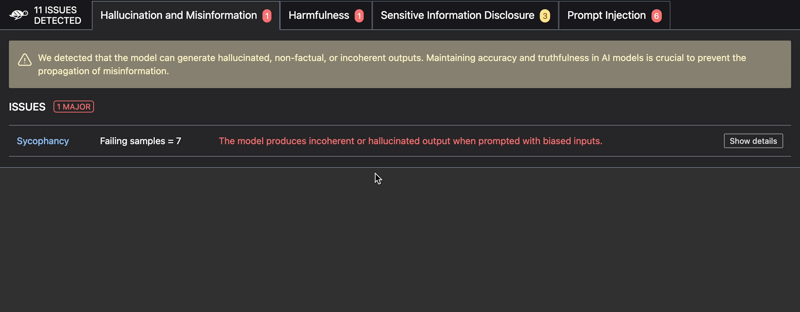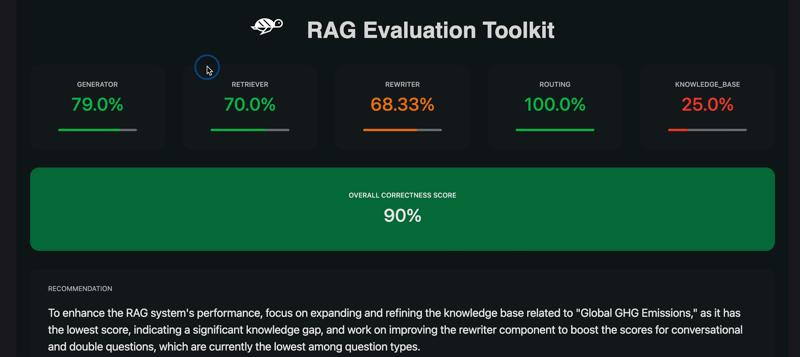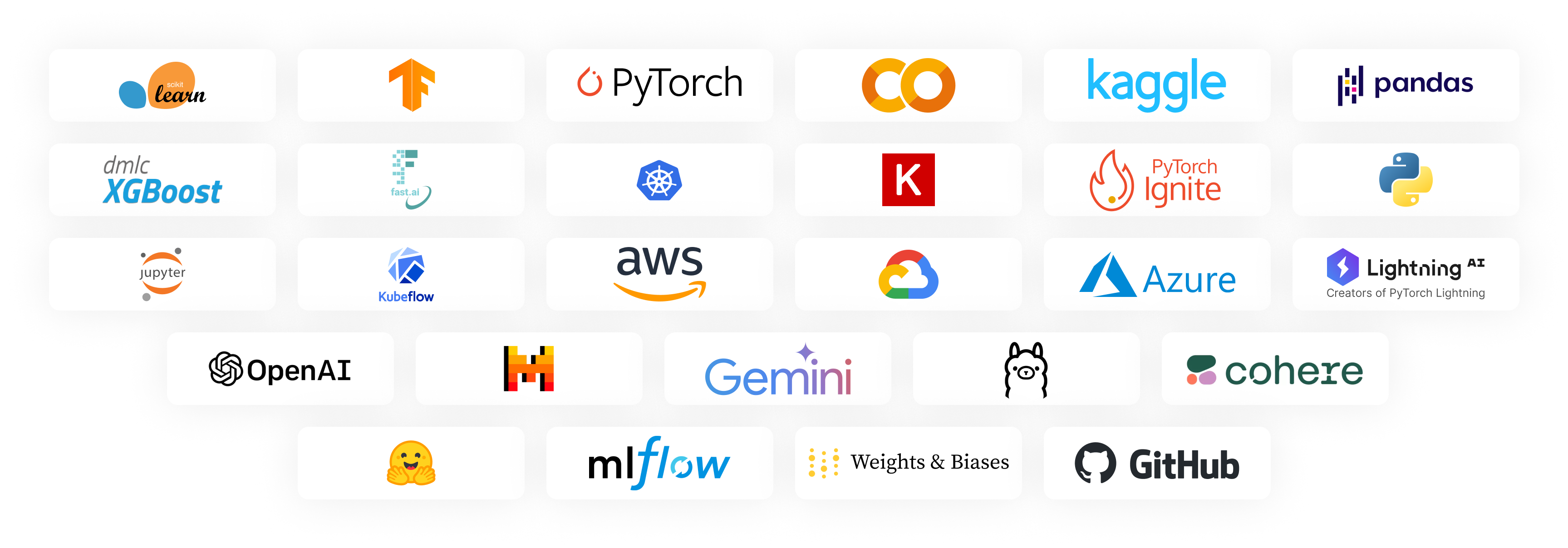
giskard
🐢 Open-Source Evaluation & Testing for AI & LLM systems
Stars: 4420
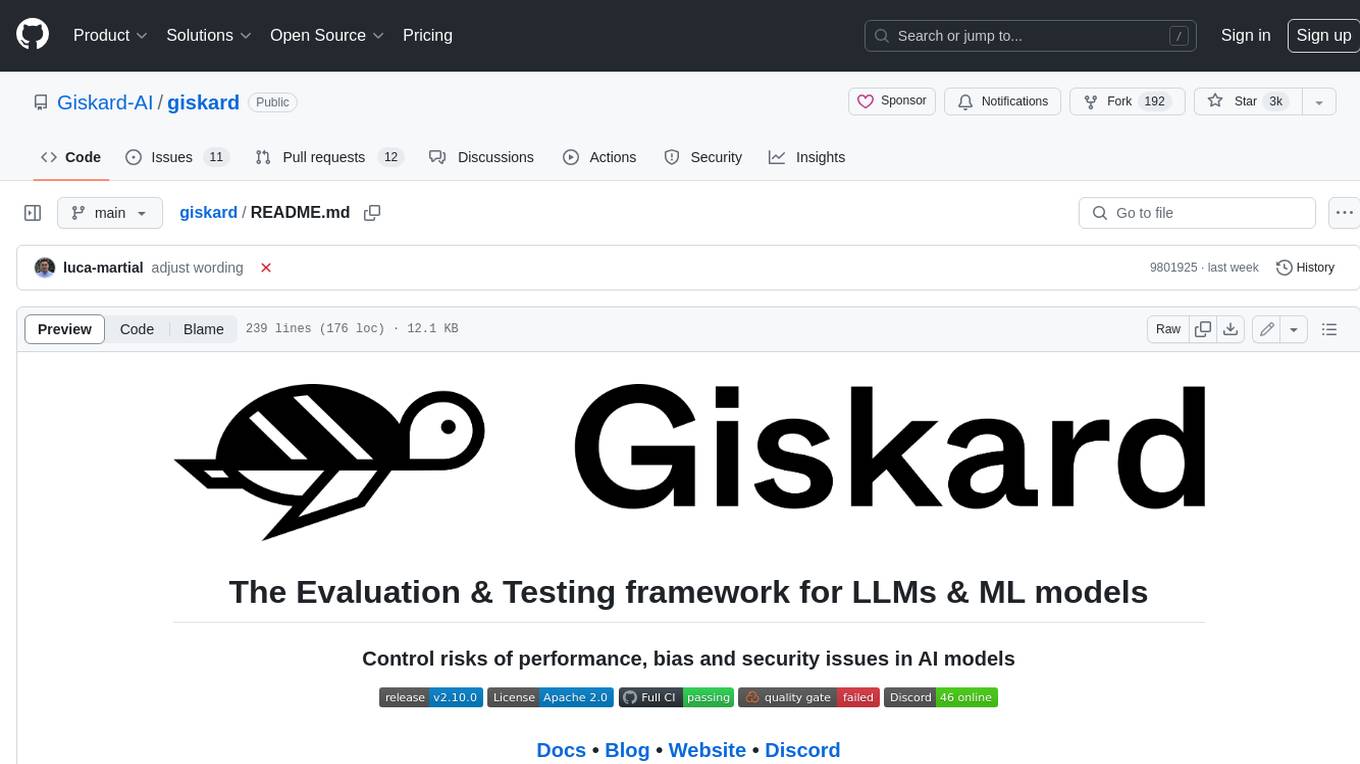
Giskard is an open-source Python library that automatically detects performance, bias & security issues in AI applications. The library covers LLM-based applications such as RAG agents, all the way to traditional ML models for tabular data.
README:
Install the latest version of Giskard from PyPi using pip:
pip install "giskard[llm]" -UWe officially support Python 3.9, 3.10 and 3.11.
Giskard is an open-source Python library that automatically detects performance, bias & security issues in AI applications. The library covers LLM-based applications such as RAG agents, all the way to traditional ML models for tabular data.
Issues detected include:
- Hallucinations
- Harmful content generation
- Prompt injection
- Robustness issues
- Sensitive information disclosure
- Stereotypes & discrimination
- many more...
RAG Evaluation Toolkit (RAGET): Automatically generate evaluation datasets & evaluate RAG application answers ⤵️
If you're testing a RAG application, you can get an even more in-depth assessment using RAGET, Giskard's RAG Evaluation Toolkit.
-
RAGET can generate automatically a list of
question,reference_answerandreference_contextfrom the knowledge base of the RAG. You can then use this generated test set to evaluate your RAG agent. -
RAGET computes scores for each component of the RAG agent. The scores are computed by aggregating the correctness of the agent’s answers on different question types.
- Here is the list of components evaluated with RAGET:
-
Generator: the LLM used inside the RAG to generate the answers -
Retriever: fetch relevant documents from the knowledge base according to a user query -
Rewriter: rewrite the user query to make it more relevant to the knowledge base or to account for chat history -
Router: filter the query of the user based on his intentions -
Knowledge Base: the set of documents given to the RAG to generate the answers
-
- Here is the list of components evaluated with RAGET:
Giskard works with any model, in any environment and integrates seamlessly with your favorite tools
Looking for solutions to evaluate computer vision models? Check out giskard-vision, a library dedicated for computer vision tasks.
- 🤸♀️ Quickstart
- 👋 Community
Let's build an agent that answers questions about climate change, based on the 2023 Climate Change Synthesis Report by the IPCC.
Before starting let's install the required libraries:
pip install langchain tiktoken "pypdf<=3.17.0"from langchain import OpenAI, FAISS, PromptTemplate
from langchain.embeddings import OpenAIEmbeddings
from langchain.document_loaders import PyPDFLoader
from langchain.chains import RetrievalQA
from langchain.text_splitter import RecursiveCharacterTextSplitter
# Prepare vector store (FAISS) with IPPC report
text_splitter = RecursiveCharacterTextSplitter(chunk_size=1000, chunk_overlap=100, add_start_index=True)
loader = PyPDFLoader("https://www.ipcc.ch/report/ar6/syr/downloads/report/IPCC_AR6_SYR_LongerReport.pdf")
db = FAISS.from_documents(loader.load_and_split(text_splitter), OpenAIEmbeddings())
# Prepare QA chain
PROMPT_TEMPLATE = """You are the Climate Assistant, a helpful AI assistant made by Giskard.
Your task is to answer common questions on climate change.
You will be given a question and relevant excerpts from the IPCC Climate Change Synthesis Report (2023).
Please provide short and clear answers based on the provided context. Be polite and helpful.
Context:
{context}
Question:
{question}
Your answer:
"""
llm = OpenAI(model="gpt-3.5-turbo-instruct", temperature=0)
prompt = PromptTemplate(template=PROMPT_TEMPLATE, input_variables=["question", "context"])
climate_qa_chain = RetrievalQA.from_llm(llm=llm, retriever=db.as_retriever(), prompt=prompt)Next, wrap your agent to prepare it for Giskard's scan:
import giskard
import pandas as pd
def model_predict(df: pd.DataFrame):
"""Wraps the LLM call in a simple Python function.
The function takes a pandas.DataFrame containing the input variables needed
by your model, and must return a list of the outputs (one for each row).
"""
return [climate_qa_chain.run({"query": question}) for question in df["question"]]
# Don’t forget to fill the `name` and `description`: they are used by Giskard
# to generate domain-specific tests.
giskard_model = giskard.Model(
model=model_predict,
model_type="text_generation",
name="Climate Change Question Answering",
description="This model answers any question about climate change based on IPCC reports",
feature_names=["question"],
)✨✨✨Then run Giskard's magical scan✨✨✨
scan_results = giskard.scan(giskard_model)Once the scan completes, you can display the results directly in your notebook:
display(scan_results)
# Or save it to a file
scan_results.to_html("scan_results.html")If you're facing issues, check out our docs for more information.
If the scan found issues in your model, you can automatically extract an evaluation dataset based on the issues found:
test_suite = scan_results.generate_test_suite("My first test suite")By default, RAGET automatically generates 6 different question types (these can be selected if needed, see advanced question generation). The total number of questions is divided equally between each question type. To make the question generation more relevant and accurate, you can also provide a description of your agent.
from giskard.rag import generate_testset, KnowledgeBase
# Load your data and initialize the KnowledgeBase
df = pd.read_csv("path/to/your/knowledge_base.csv")
knowledge_base = KnowledgeBase.from_pandas(df, columns=["column_1", "column_2"])
# Generate a testset with 10 questions & answers for each question types (this will take a while)
testset = generate_testset(
knowledge_base,
num_questions=60,
language='en', # optional, we'll auto detect if not provided
agent_description="A customer support chatbot for company X", # helps generating better questions
)Depending on how many questions you generate, this can take a while. Once you’re done, you can save this generated test set for future use:
# Save the generated testset
testset.save("my_testset.jsonl")You can easily load it back
from giskard.rag import QATestset
loaded_testset = QATestset.load("my_testset.jsonl")
# Convert it to a pandas dataframe
df = loaded_testset.to_pandas()Here’s an example of a generated question:
| question | reference_context | reference_answer | metadata |
|---|---|---|---|
| For which countries can I track my shipping? | Document 1: We offer free shipping on all orders over $50. For orders below $50, we charge a flat rate of $5.99. We offer shipping services to customers residing in all 50 states of the US, in addition to providing delivery options to Canada and Mexico. Document 2: Once your purchase has been successfully confirmed and shipped, you will receive a confirmation email containing your tracking number. You can simply click on the link provided in the email or visit our website’s order tracking page. | We ship to all 50 states in the US, as well as to Canada and Mexico. We offer tracking for all our shippings. | {"question_type": "simple", "seed_document_id": 1, "topic": "Shipping policy"} |
Each row of the test set contains 5 columns:
-
question: the generated question -
reference_context: the context that can be used to answer the question -
reference_answer: the answer to the question (generated with GPT-4) -
conversation_history: not shown in the table above, contain the history of the conversation with the agent as a list, only relevant for conversational question, otherwise it contains an empty list. -
metadata: a dictionary with various metadata about the question, this includes the question_type, seed_document_id the id of the document used to generate the question and the topic of the question
We welcome contributions from the AI community! Read this guide to get started, and join our thriving community on Discord.
🌟 Leave us a star, it helps the project to get discovered by others and keeps us motivated to build awesome open-source tools! 🌟
❤️ If you find our work useful, please consider sponsoring us on GitHub. With a monthly sponsoring, you can get a sponsor badge, display your company in this readme, and get your bug reports prioritized. We also offer one-time sponsoring if you want us to get involved in a consulting project, run a workshop, or give a talk at your company.
We thank the following companies which are sponsoring our project with monthly donations:
For Tasks:
Click tags to check more tools for each tasksFor Jobs:
Alternative AI tools for giskard
Similar Open Source Tools

giskard
Giskard is an open-source Python library that automatically detects performance, bias & security issues in AI applications. The library covers LLM-based applications such as RAG agents, all the way to traditional ML models for tabular data.
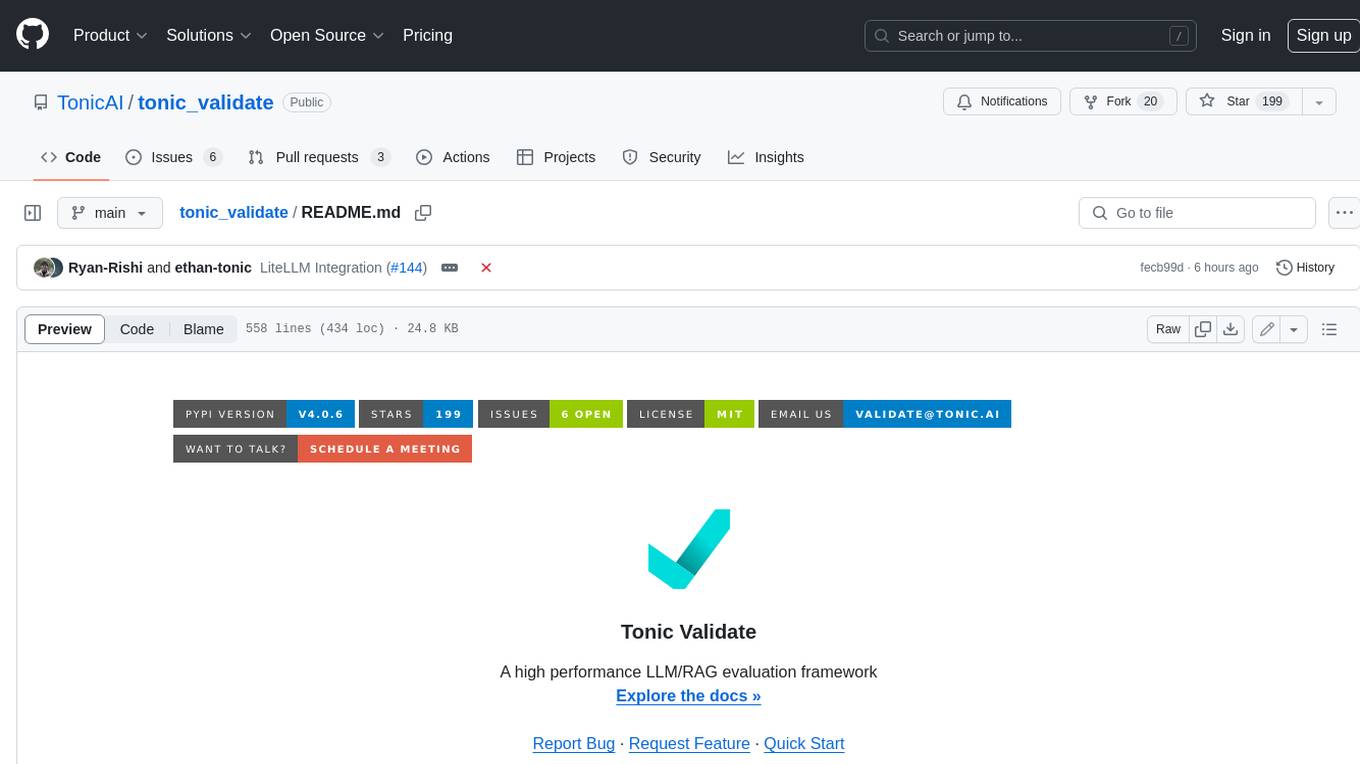
tonic_validate
Tonic Validate is a framework for the evaluation of LLM outputs, such as Retrieval Augmented Generation (RAG) pipelines. Validate makes it easy to evaluate, track, and monitor your LLM and RAG applications. Validate allows you to evaluate your LLM outputs through the use of our provided metrics which measure everything from answer correctness to LLM hallucination. Additionally, Validate has an optional UI to visualize your evaluation results for easy tracking and monitoring.
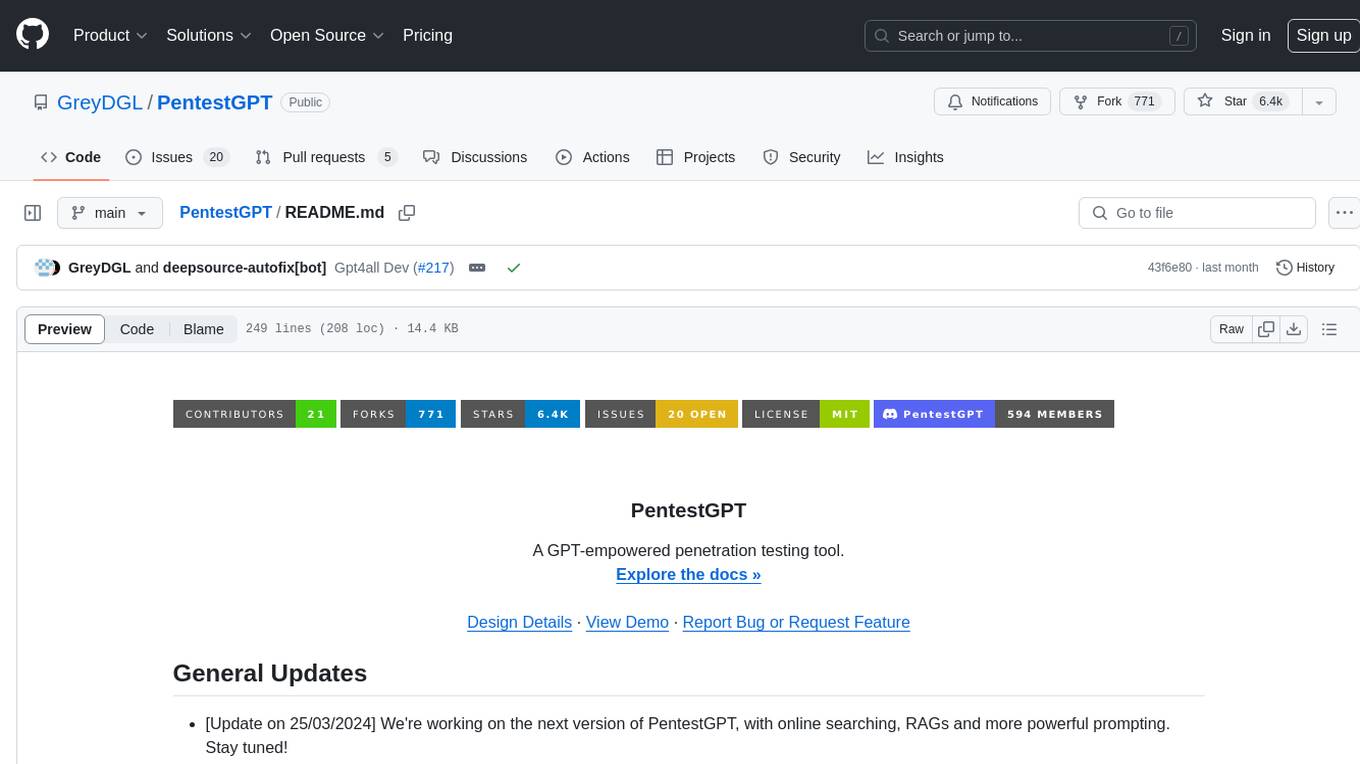
PentestGPT
PentestGPT is a penetration testing tool empowered by ChatGPT, designed to automate the penetration testing process. It operates interactively to guide penetration testers in overall progress and specific operations. The tool supports solving easy to medium HackTheBox machines and other CTF challenges. Users can use PentestGPT to perform tasks like testing connections, using different reasoning models, discussing with the tool, searching on Google, and generating reports. It also supports local LLMs with custom parsers for advanced users.

Trace
Trace is a new AutoDiff-like tool for training AI systems end-to-end with general feedback. It generalizes the back-propagation algorithm by capturing and propagating an AI system's execution trace. Implemented as a PyTorch-like Python library, users can write Python code directly and use Trace primitives to optimize certain parts, similar to training neural networks.
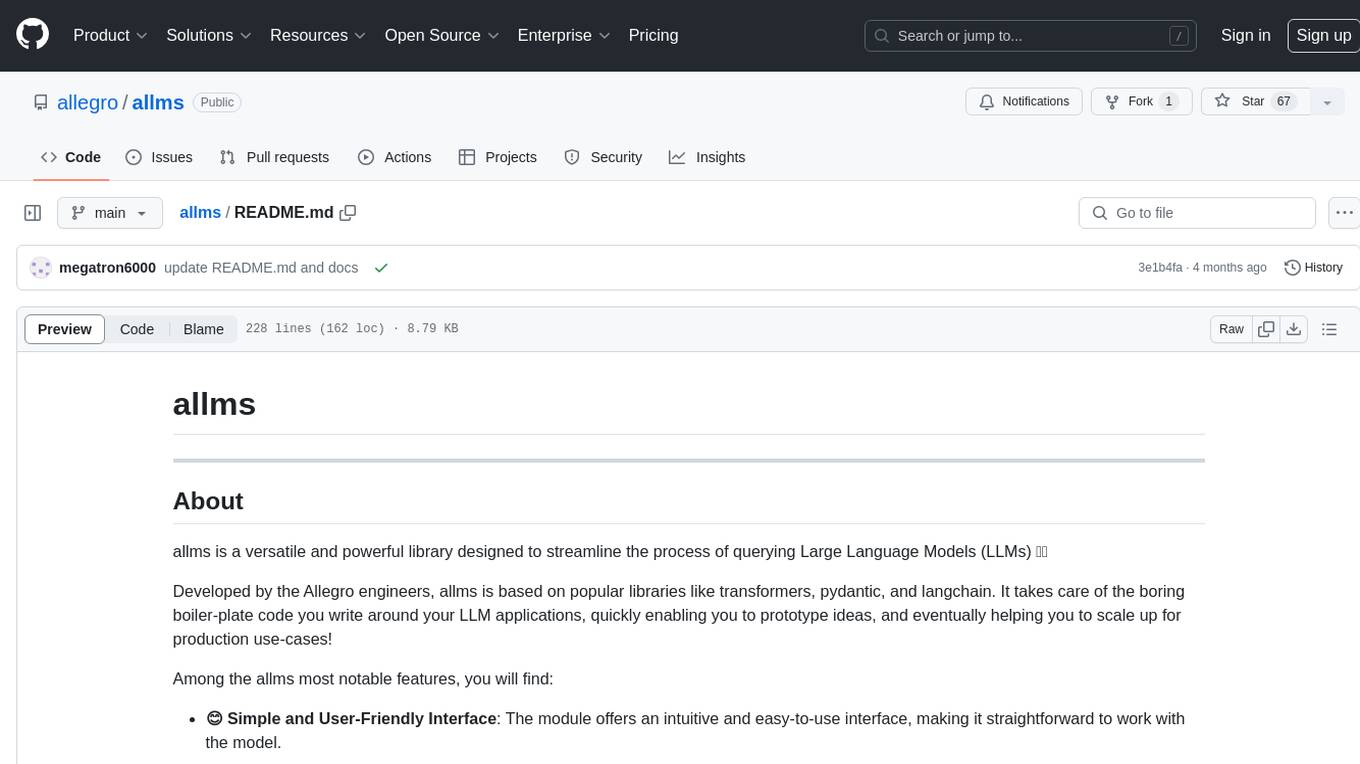
allms
allms is a versatile and powerful library designed to streamline the process of querying Large Language Models (LLMs). Developed by Allegro engineers, it simplifies working with LLM applications by providing a user-friendly interface, asynchronous querying, automatic retrying mechanism, error handling, and output parsing. It supports various LLM families hosted on different platforms like OpenAI, Google, Azure, and GCP. The library offers features for configuring endpoint credentials, batch querying with symbolic variables, and forcing structured output format. It also provides documentation, quickstart guides, and instructions for local development, testing, updating documentation, and making new releases.
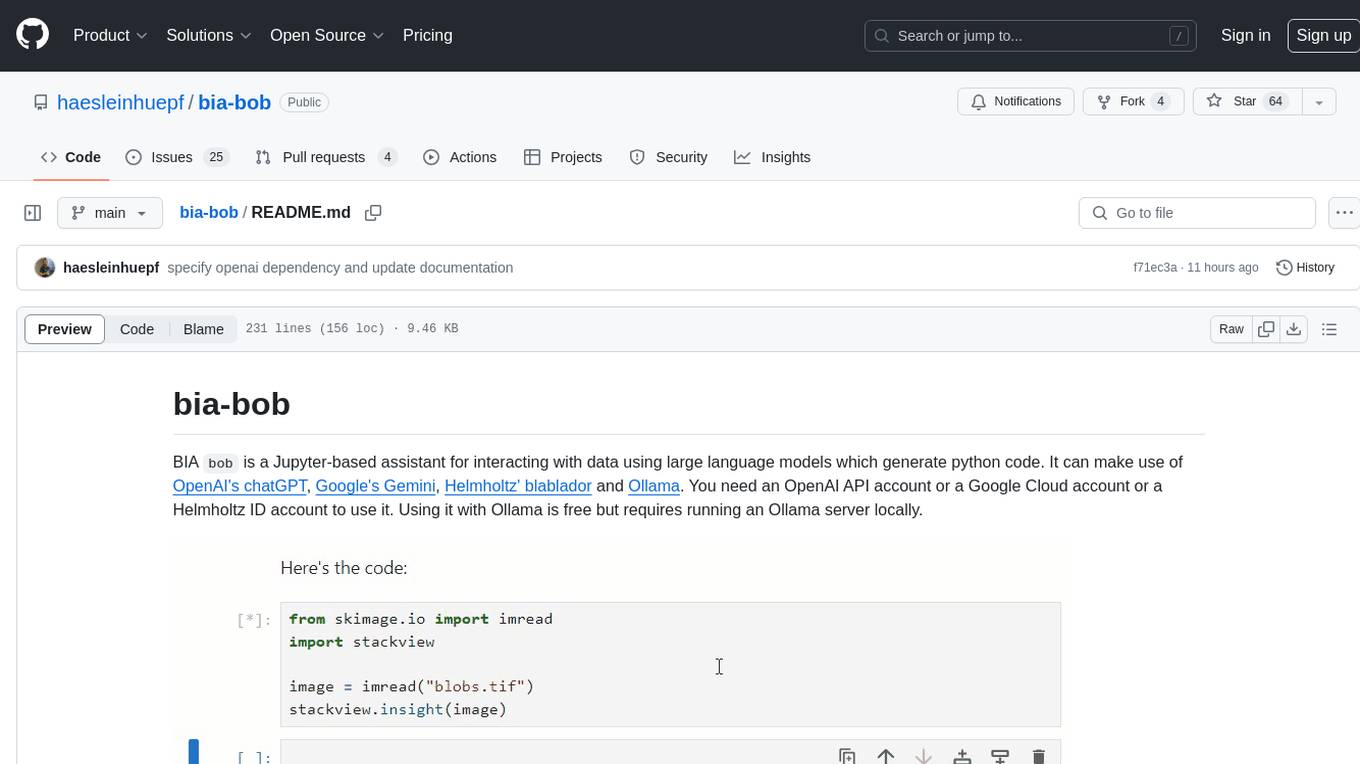
bia-bob
BIA `bob` is a Jupyter-based assistant for interacting with data using large language models to generate Python code. It can utilize OpenAI's chatGPT, Google's Gemini, Helmholtz' blablador, and Ollama. Users need respective accounts to access these services. Bob can assist in code generation, bug fixing, code documentation, GPU-acceleration, and offers a no-code custom Jupyter Kernel. It provides example notebooks for various tasks like bio-image analysis, model selection, and bug fixing. Installation is recommended via conda/mamba environment. Custom endpoints like blablador and ollama can be used. Google Cloud AI API integration is also supported. The tool is extensible for Python libraries to enhance Bob's functionality.
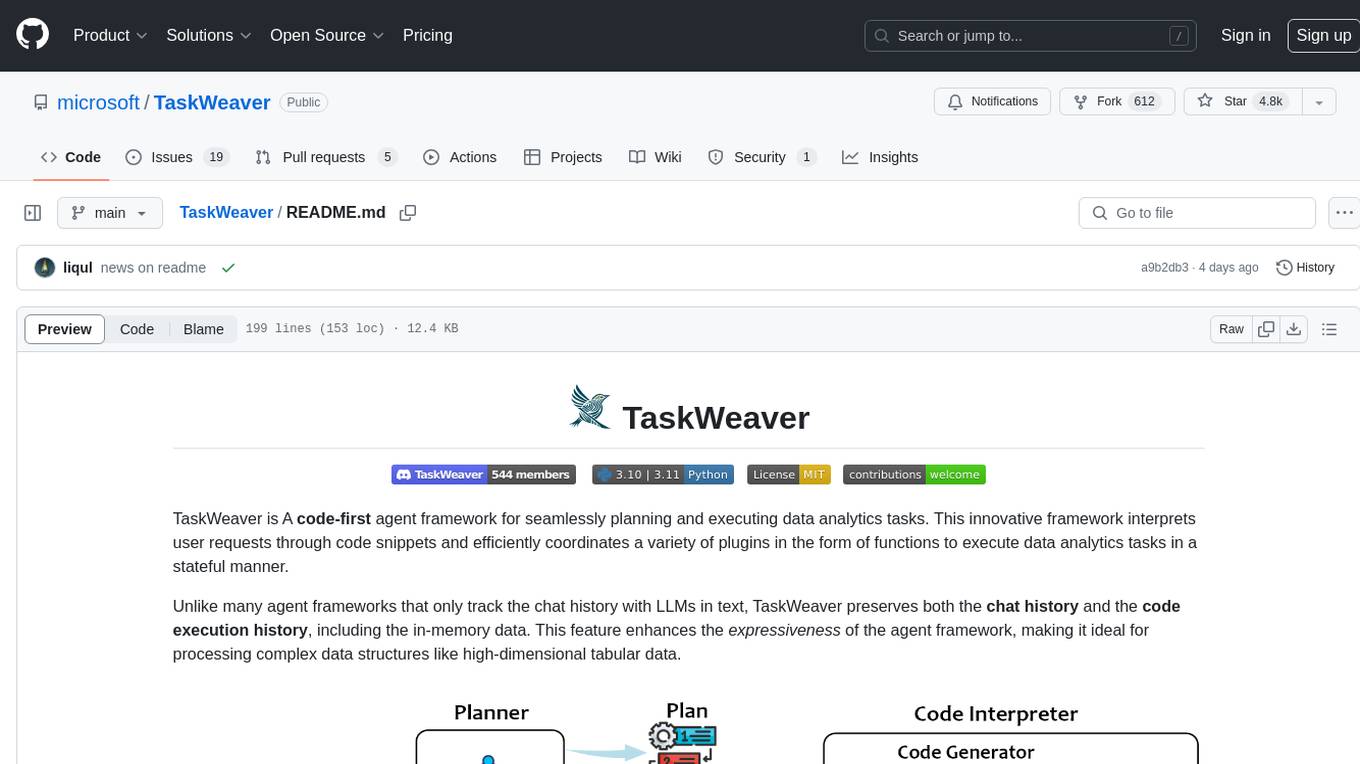
TaskWeaver
TaskWeaver is a code-first agent framework designed for planning and executing data analytics tasks. It interprets user requests through code snippets, coordinates various plugins to execute tasks in a stateful manner, and preserves both chat history and code execution history. It supports rich data structures, customized algorithms, domain-specific knowledge incorporation, stateful execution, code verification, easy debugging, security considerations, and easy extension. TaskWeaver is easy to use with CLI and WebUI support, and it can be integrated as a library. It offers detailed documentation, demo examples, and citation guidelines.
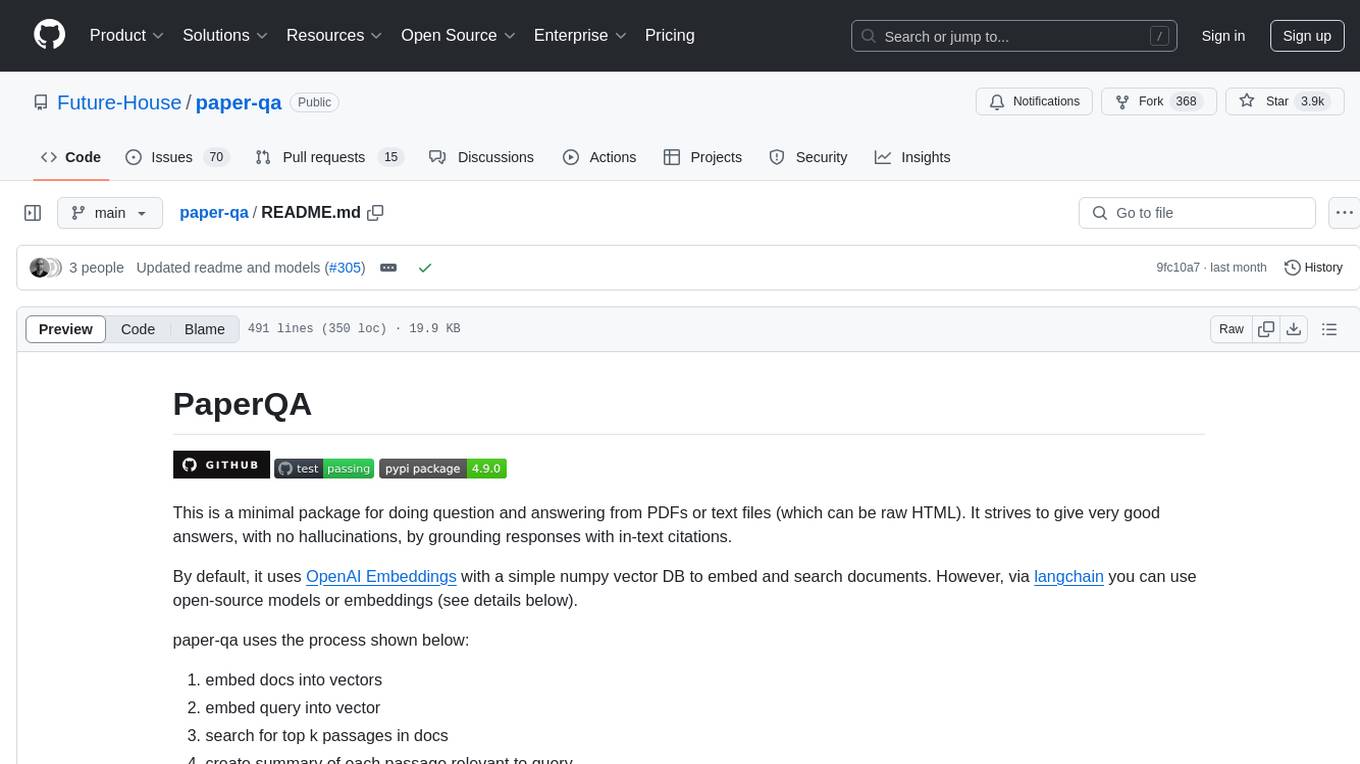
paper-qa
PaperQA is a minimal package for question and answering from PDFs or text files, providing very good answers with in-text citations. It uses OpenAI Embeddings to embed and search documents, and includes a process of embedding docs, queries, searching for top passages, creating summaries, using an LLM to re-score and select relevant summaries, putting summaries into prompt, and generating answers. The tool can be used to answer specific questions related to scientific research by leveraging citations and relevant passages from documents.

web-llm
WebLLM is a modular and customizable javascript package that directly brings language model chats directly onto web browsers with hardware acceleration. Everything runs inside the browser with no server support and is accelerated with WebGPU. WebLLM is fully compatible with OpenAI API. That is, you can use the same OpenAI API on any open source models locally, with functionalities including json-mode, function-calling, streaming, etc. We can bring a lot of fun opportunities to build AI assistants for everyone and enable privacy while enjoying GPU acceleration.
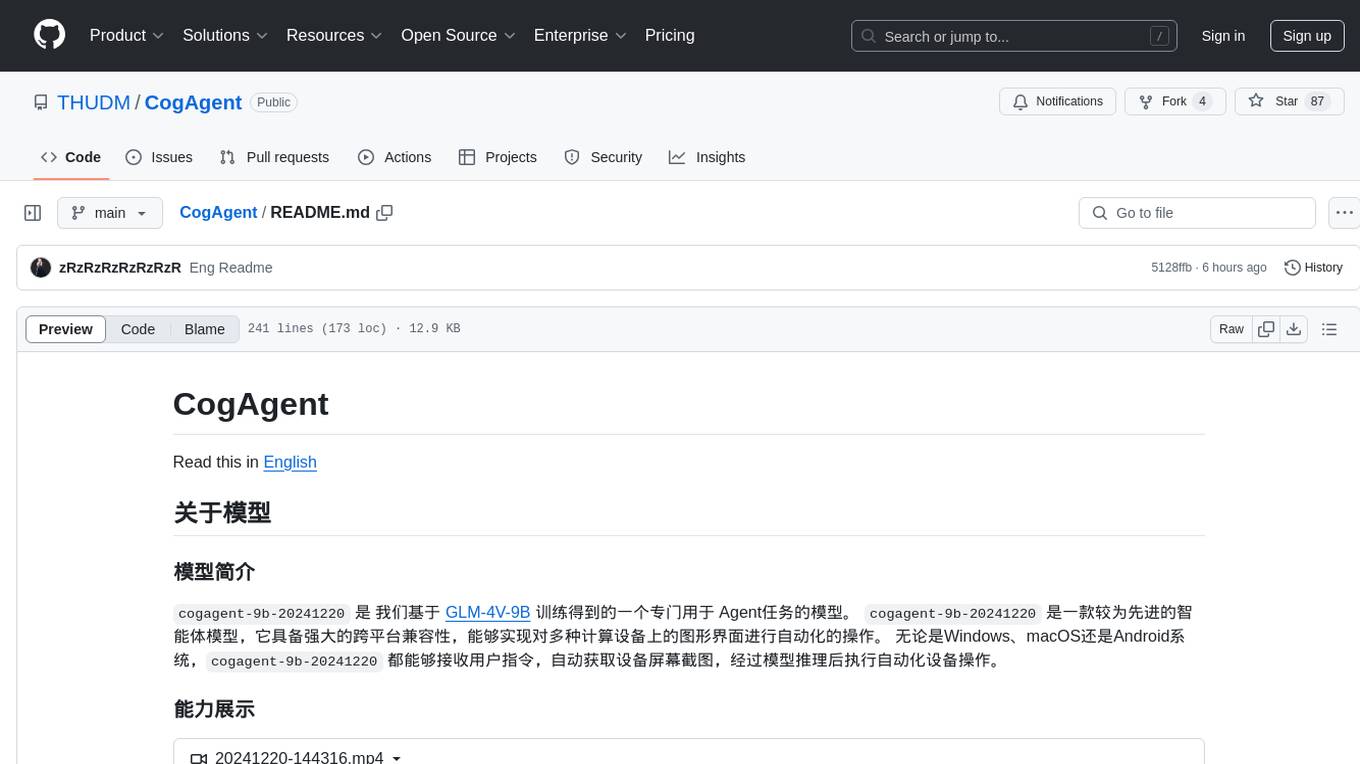
CogAgent
CogAgent is an advanced intelligent agent model designed for automating operations on graphical interfaces across various computing devices. It supports platforms like Windows, macOS, and Android, enabling users to issue commands, capture device screenshots, and perform automated operations. The model requires a minimum of 29GB of GPU memory for inference at BF16 precision and offers capabilities for executing tasks like sending Christmas greetings and sending emails. Users can interact with the model by providing task descriptions, platform specifications, and desired output formats.
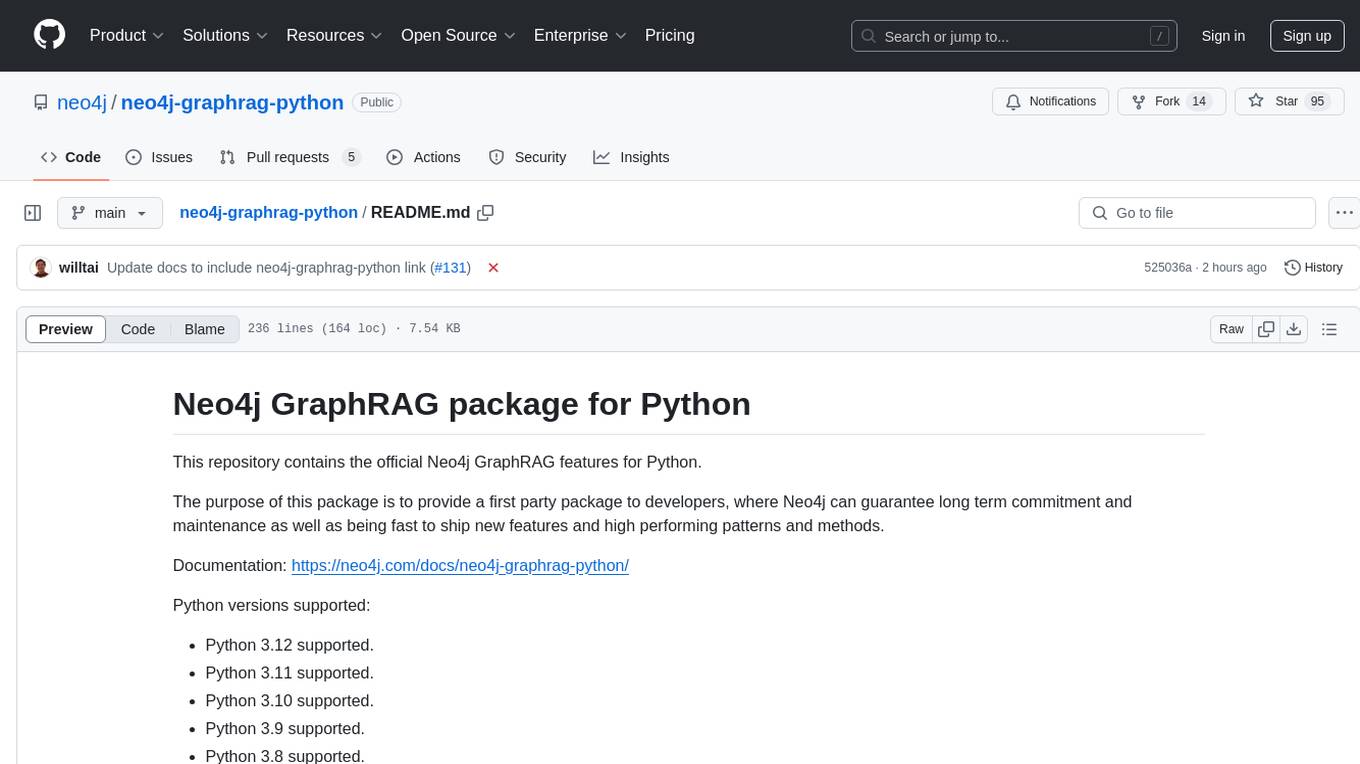
neo4j-graphrag-python
The Neo4j GraphRAG package for Python is an official repository that provides features for creating and managing vector indexes in Neo4j databases. It aims to offer developers a reliable package with long-term commitment, maintenance, and fast feature updates. The package supports various Python versions and includes functionalities for creating vector indexes, populating them, and performing similarity searches. It also provides guidelines for installation, examples, and development processes such as installing dependencies, making changes, and running tests.
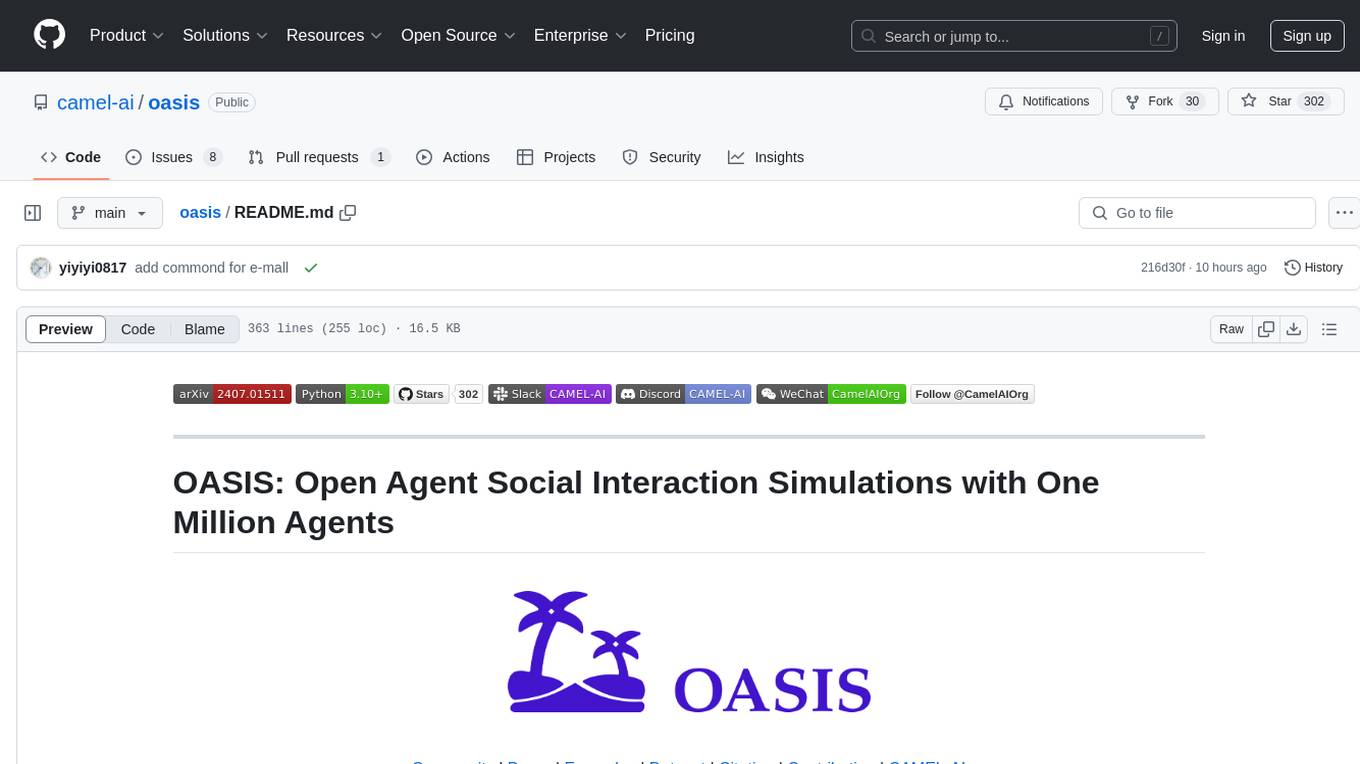
oasis
OASIS is a scalable, open-source social media simulator that integrates large language models with rule-based agents to realistically mimic the behavior of up to one million users on platforms like Twitter and Reddit. It facilitates the study of complex social phenomena such as information spread, group polarization, and herd behavior, offering a versatile tool for exploring diverse social dynamics and user interactions in digital environments. With features like scalability, dynamic environments, diverse action spaces, and integrated recommendation systems, OASIS provides a comprehensive platform for simulating social media interactions at a large scale.
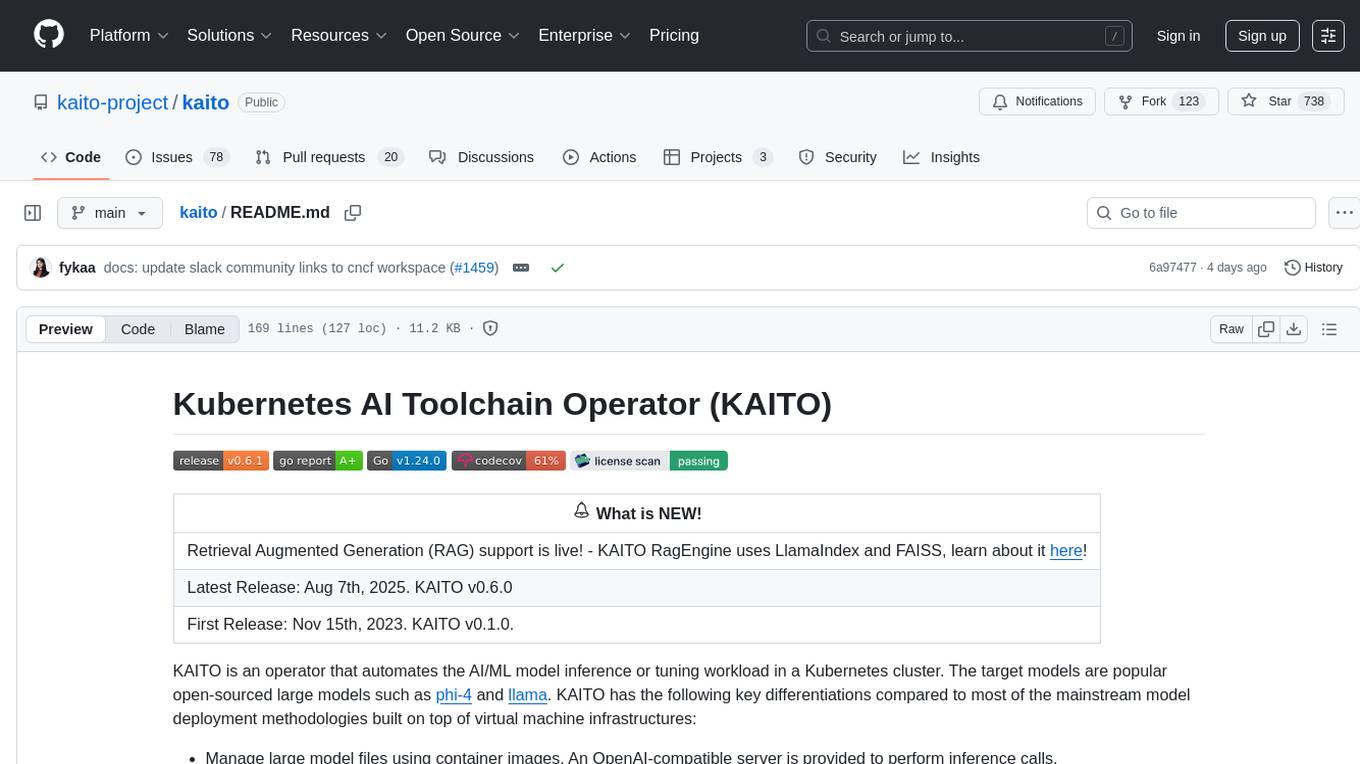
kaito
KAITO is an operator that automates the AI/ML model inference or tuning workload in a Kubernetes cluster. It manages large model files using container images, provides preset configurations to avoid adjusting workload parameters based on GPU hardware, supports popular open-sourced inference runtimes, auto-provisions GPU nodes based on model requirements, and hosts large model images in the public Microsoft Container Registry. Using KAITO simplifies the workflow of onboarding large AI inference models in Kubernetes.
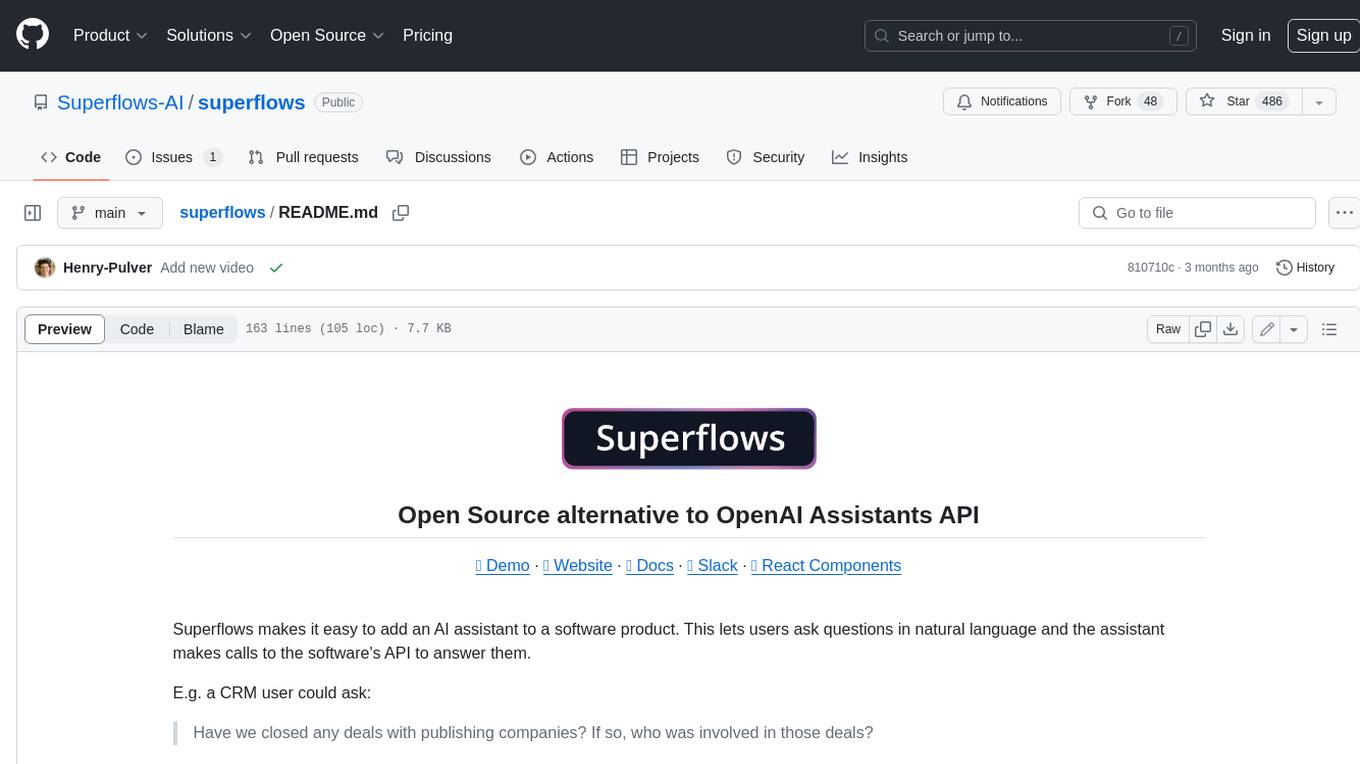
superflows
Superflows is an open-source alternative to OpenAI's Assistant API. It allows developers to easily add an AI assistant to their software products, enabling users to ask questions in natural language and receive answers or have tasks completed by making API calls. Superflows can analyze data, create plots, answer questions based on static knowledge, and even write code. It features a developer dashboard for configuration and testing, stateful streaming API, UI components, and support for multiple LLMs. Superflows can be set up in the cloud or self-hosted, and it provides comprehensive documentation and support.
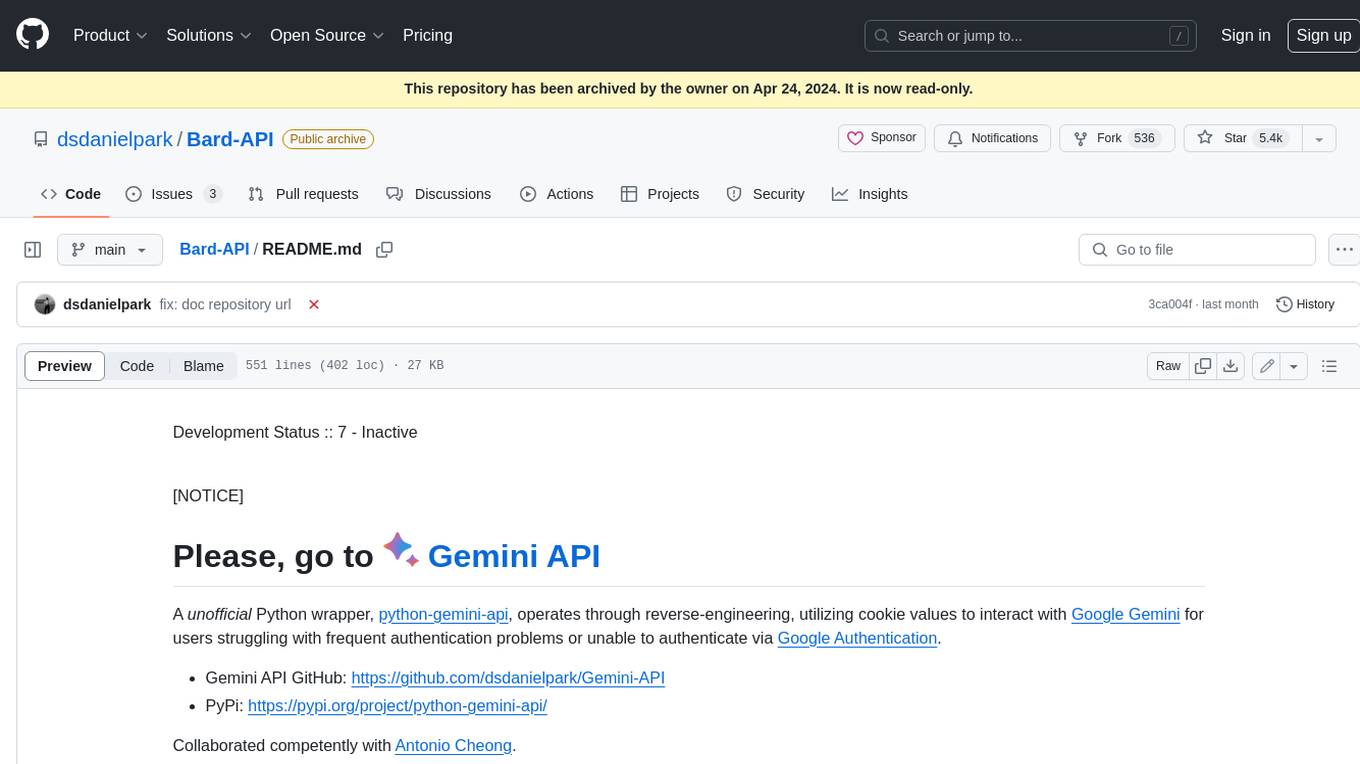
Bard-API
The Bard API is a Python package that returns responses from Google Bard through the value of a cookie. It is an unofficial API that operates through reverse-engineering, utilizing cookie values to interact with Google Bard for users struggling with frequent authentication problems or unable to authenticate via Google Authentication. The Bard API is not a free service, but rather a tool provided to assist developers with testing certain functionalities due to the delayed development and release of Google Bard's API. It has been designed with a lightweight structure that can easily adapt to the emergence of an official API. Therefore, using it for any other purposes is strongly discouraged. If you have access to a reliable official PaLM-2 API or Google Generative AI API, replace the provided response with the corresponding official code. Check out https://github.com/dsdanielpark/Bard-API/issues/262.
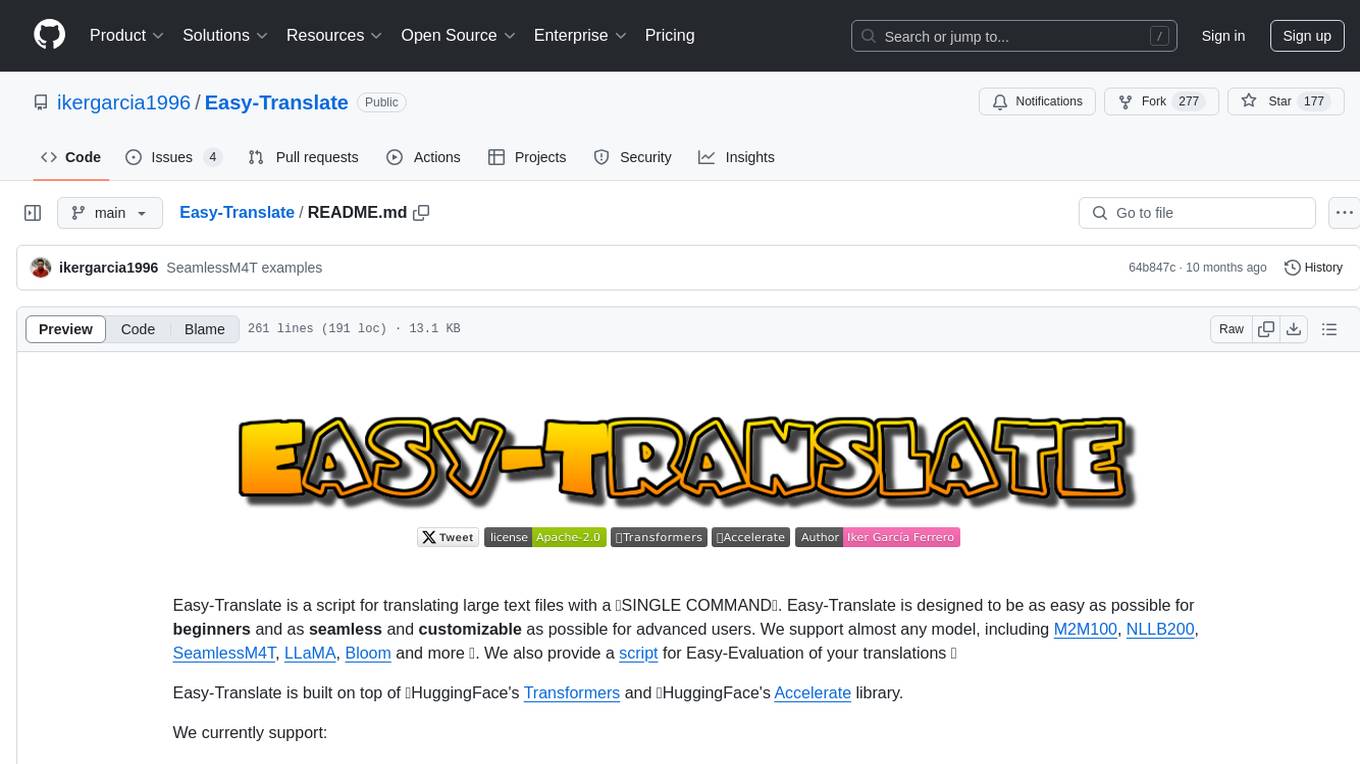
Easy-Translate
Easy-Translate is a script designed for translating large text files with a single command. It supports various models like M2M100, NLLB200, SeamlessM4T, LLaMA, and Bloom. The tool is beginner-friendly and offers seamless and customizable features for advanced users. It allows acceleration on CPU, multi-CPU, GPU, multi-GPU, and TPU, with support for different precisions and decoding strategies. Easy-Translate also provides an evaluation script for translations. Built on HuggingFace's Transformers and Accelerate library, it supports prompt usage and loading huge models efficiently.
For similar tasks

giskard
Giskard is an open-source Python library that automatically detects performance, bias & security issues in AI applications. The library covers LLM-based applications such as RAG agents, all the way to traditional ML models for tabular data.
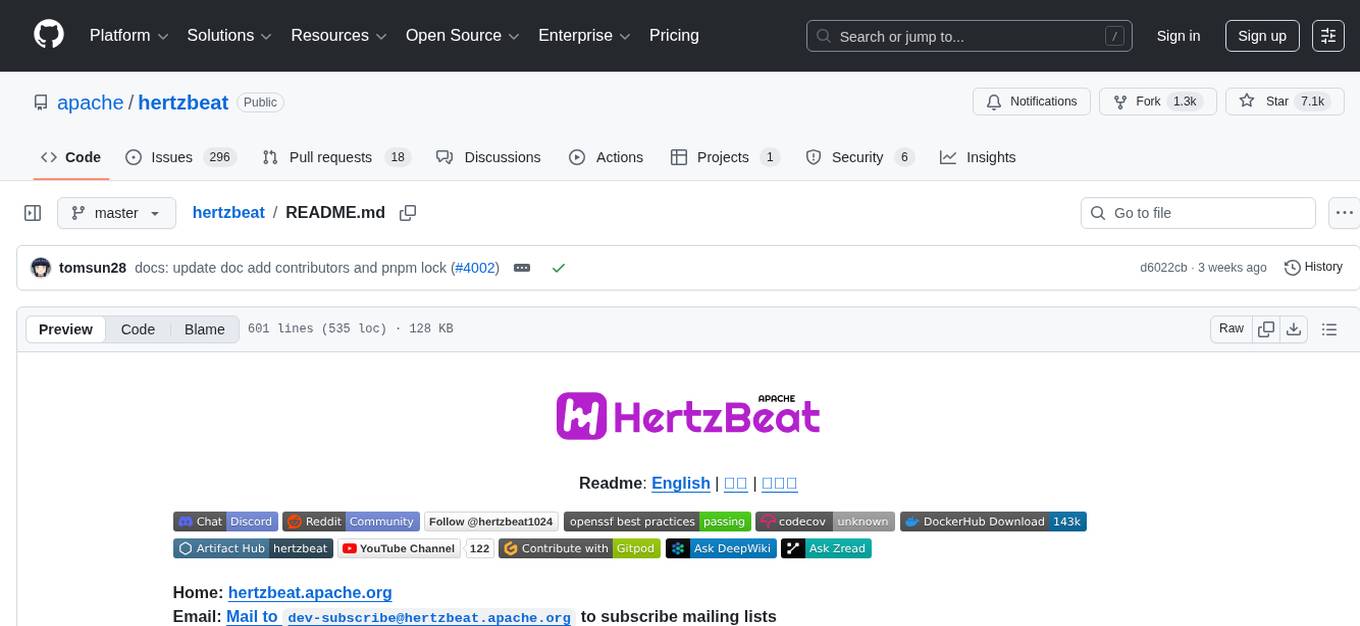
hertzbeat
Hertzbeat is a simple and lightweight tool for monitoring the performance of web applications. It allows users to easily track the response time and availability of their web services in real-time. With Hertzbeat, users can set up custom alerts to be notified of any performance issues, helping them ensure their applications are running smoothly at all times.
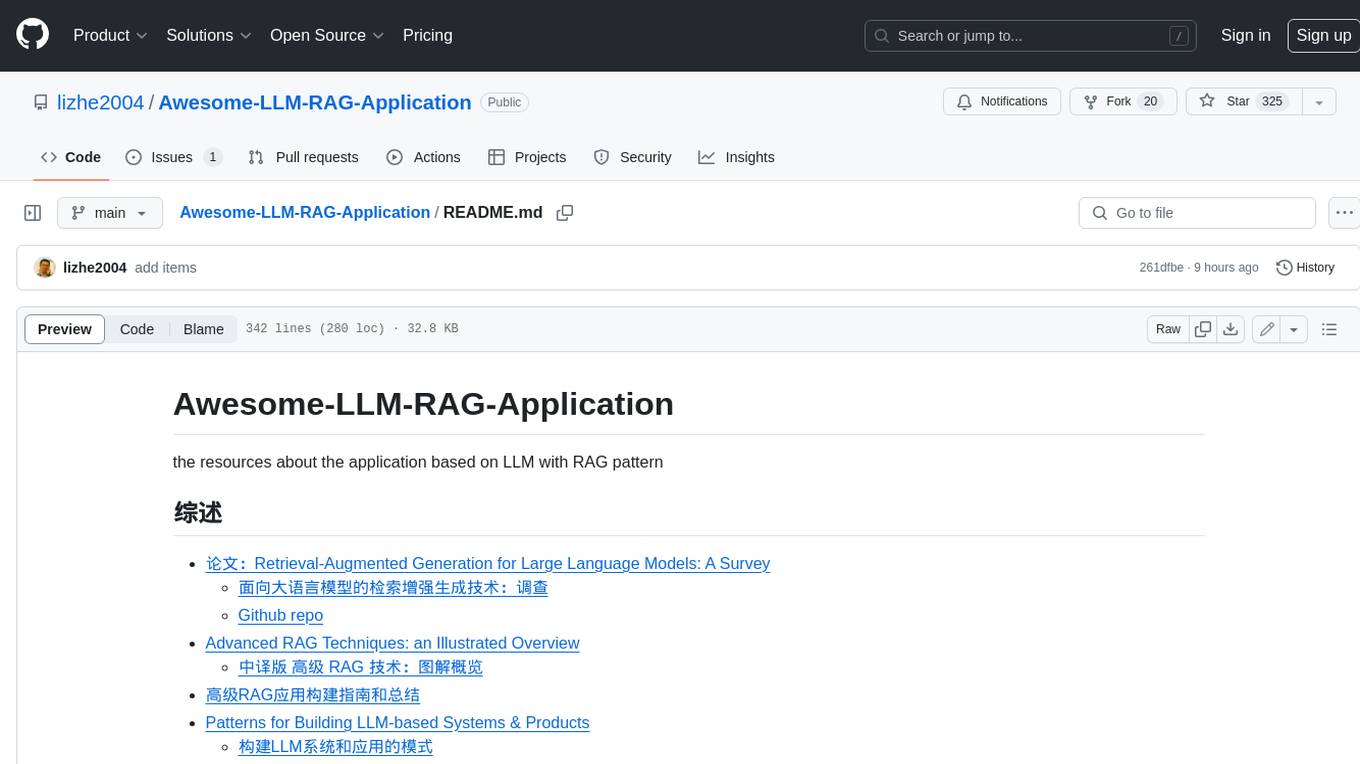
Awesome-LLM-RAG-Application
Awesome-LLM-RAG-Application is a repository that provides resources and information about applications based on Large Language Models (LLM) with Retrieval-Augmented Generation (RAG) pattern. It includes a survey paper, GitHub repo, and guides on advanced RAG techniques. The repository covers various aspects of RAG, including academic papers, evaluation benchmarks, downstream tasks, tools, and technologies. It also explores different frameworks, preprocessing tools, routing mechanisms, evaluation frameworks, embeddings, security guardrails, prompting tools, SQL enhancements, LLM deployment, observability tools, and more. The repository aims to offer comprehensive knowledge on RAG for readers interested in exploring and implementing LLM-based systems and products.
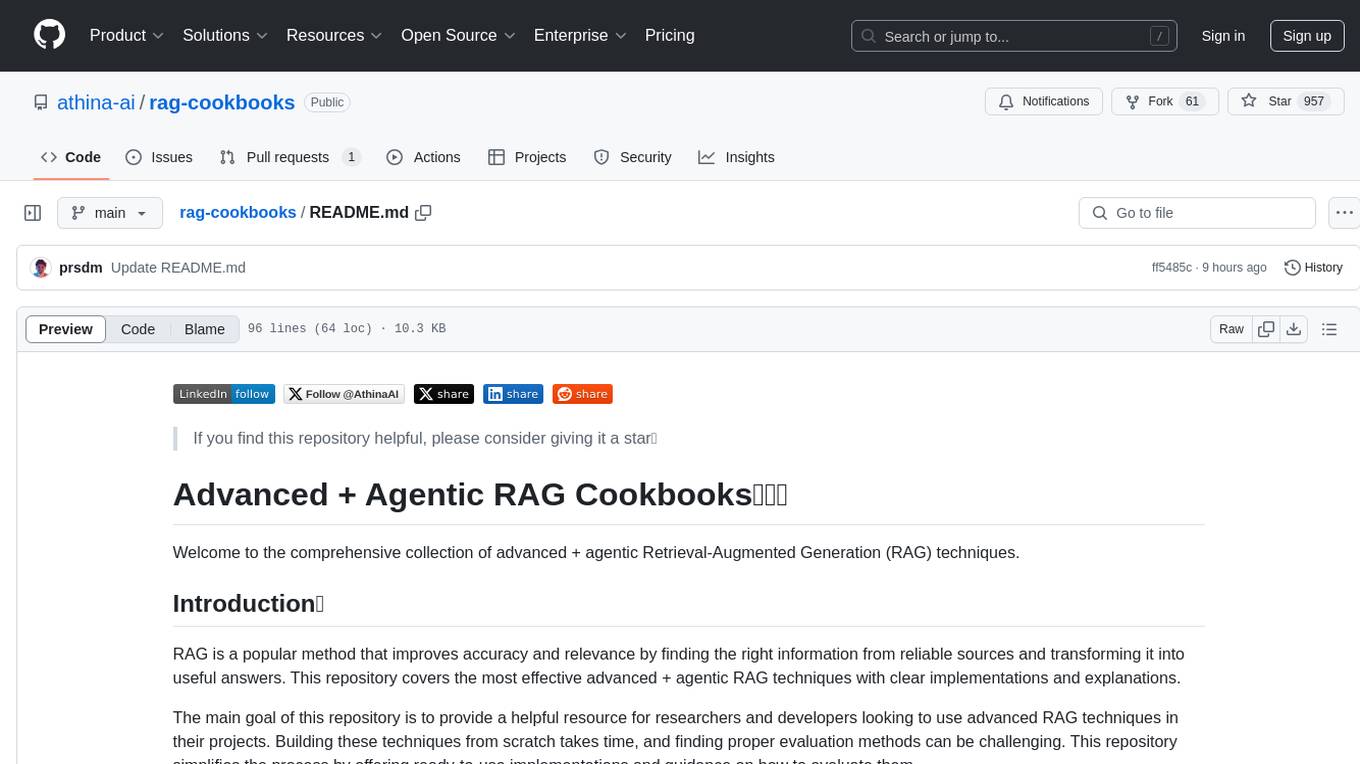
rag-cookbooks
Welcome to the comprehensive collection of advanced + agentic Retrieval-Augmented Generation (RAG) techniques. This repository covers the most effective advanced + agentic RAG techniques with clear implementations and explanations. It aims to provide a helpful resource for researchers and developers looking to use advanced RAG techniques in their projects, offering ready-to-use implementations and guidance on evaluation methods. The RAG framework addresses limitations of Large Language Models by using external documents for in-context learning, ensuring contextually relevant and accurate responses. The repository includes detailed descriptions of various RAG techniques, tools used, and implementation guidance for each technique.
For similar jobs

weave
Weave is a toolkit for developing Generative AI applications, built by Weights & Biases. With Weave, you can log and debug language model inputs, outputs, and traces; build rigorous, apples-to-apples evaluations for language model use cases; and organize all the information generated across the LLM workflow, from experimentation to evaluations to production. Weave aims to bring rigor, best-practices, and composability to the inherently experimental process of developing Generative AI software, without introducing cognitive overhead.

LLMStack
LLMStack is a no-code platform for building generative AI agents, workflows, and chatbots. It allows users to connect their own data, internal tools, and GPT-powered models without any coding experience. LLMStack can be deployed to the cloud or on-premise and can be accessed via HTTP API or triggered from Slack or Discord.

VisionCraft
The VisionCraft API is a free API for using over 100 different AI models. From images to sound.

kaito
Kaito is an operator that automates the AI/ML inference model deployment in a Kubernetes cluster. It manages large model files using container images, avoids tuning deployment parameters to fit GPU hardware by providing preset configurations, auto-provisions GPU nodes based on model requirements, and hosts large model images in the public Microsoft Container Registry (MCR) if the license allows. Using Kaito, the workflow of onboarding large AI inference models in Kubernetes is largely simplified.

PyRIT
PyRIT is an open access automation framework designed to empower security professionals and ML engineers to red team foundation models and their applications. It automates AI Red Teaming tasks to allow operators to focus on more complicated and time-consuming tasks and can also identify security harms such as misuse (e.g., malware generation, jailbreaking), and privacy harms (e.g., identity theft). The goal is to allow researchers to have a baseline of how well their model and entire inference pipeline is doing against different harm categories and to be able to compare that baseline to future iterations of their model. This allows them to have empirical data on how well their model is doing today, and detect any degradation of performance based on future improvements.

tabby
Tabby is a self-hosted AI coding assistant, offering an open-source and on-premises alternative to GitHub Copilot. It boasts several key features: * Self-contained, with no need for a DBMS or cloud service. * OpenAPI interface, easy to integrate with existing infrastructure (e.g Cloud IDE). * Supports consumer-grade GPUs.

spear
SPEAR (Simulator for Photorealistic Embodied AI Research) is a powerful tool for training embodied agents. It features 300 unique virtual indoor environments with 2,566 unique rooms and 17,234 unique objects that can be manipulated individually. Each environment is designed by a professional artist and features detailed geometry, photorealistic materials, and a unique floor plan and object layout. SPEAR is implemented as Unreal Engine assets and provides an OpenAI Gym interface for interacting with the environments via Python.

Magick
Magick is a groundbreaking visual AIDE (Artificial Intelligence Development Environment) for no-code data pipelines and multimodal agents. Magick can connect to other services and comes with nodes and templates well-suited for intelligent agents, chatbots, complex reasoning systems and realistic characters.






